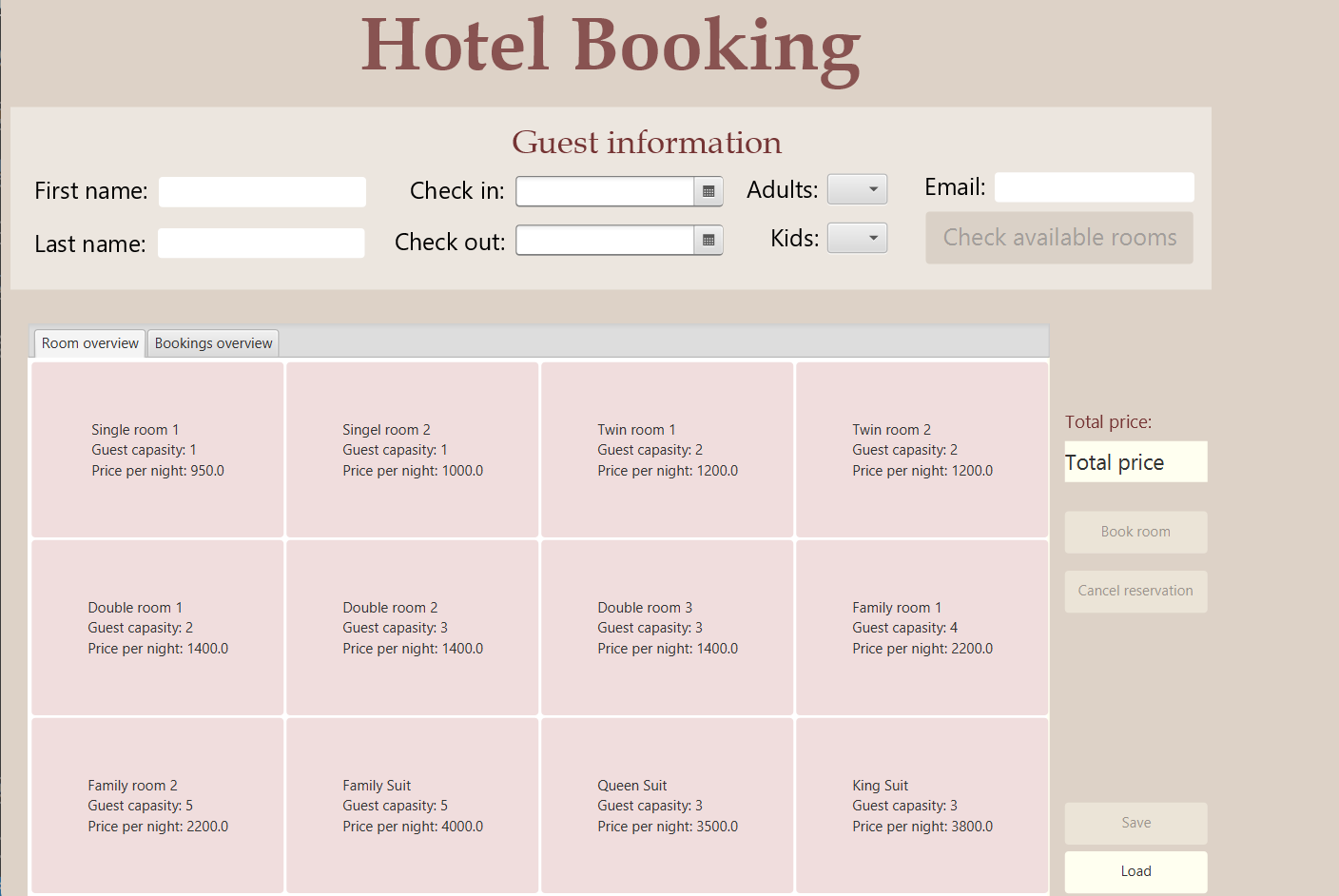Hotel Booking App: Java OOP Project
Project Overview
My teammate and I developed a full-featured Hotel Booking System using Java and JavaFX, demonstrating clean object-oriented design principles and modern development practices. The system allows users to manage hotel room bookings through a graphical interface while maintaining data persistence.
Here is a photo illustrating how the app looks like:

Key Technical Features
1. Smart Booking Logic
One of the core features is the intelligent booking validation system that prevents double bookings and ensures room capacity isn’t exceeded:
public void bookRoom(Room room, Guest guest) {
if(!checkValidGuests(guest, room)){
throw new IllegalArgumentException("Dette rommet har ikke plass til så mange gjester");
}
if (!bookedDates.containsKey(getBookedRoomID()) && checkValidGuests(guest, room)){
bookedDates.put(getBookedRoomID(), new ArrayList<ArrayList<LocalDate>>());
bookedDates.get(getBookedRoomID()).add(guest.getListOfBookedDates());
} else {
if (checkValidDates(guest) && checkValidGuests(guest, room)){
bookedDates.get(getBookedRoomID()).add(guest.getListOfBookedDates());
} else{
throw new IllegalArgumentException("Rommet kan ikke bookes innen disse datoene");
}
}
}
2. Dynamic Pricing System
We implemented a flexible pricing system that includes dynamic discounts based on the number of children:
private double calculateDiscount(Integer kids){
if (kids == 0){
discount = 1;
} else if (kids == 1){
discount = 0.9;
} else if (kids == 2){
discount = 0.85;
}else {
discount = 0.8;
}
return discount;
}
public double setTotalPrice(Room room, LocalDate checkIn, LocalDate checkOut, int kids){
totalPrice = room.getPrice() * getNights(checkIn, checkOut) * calculateDiscount(kids);
return totalPrice;
}
3. Clean GUI Integration
The application uses JavaFX with FXML for a clean separation of concerns. Here’s the main application setup:
public class HotelBookingApp extends Application {
@Override
public void start(Stage primaryStage) throws IOException {
primaryStage.setTitle("Hotel Booking");
primaryStage.setScene(new Scene(FXMLLoader.load(
getClass().getResource("HotelBookingApp.fxml"))));
primaryStage.show();
}
}
4. Robust Testing
We implemented comprehensive unit tests to ensure reliability:
@Test
@DisplayName("Tests if booking is valid")
public void testBookRoom(){
assertThrows(IllegalArgumentException.class , () -> {
booking.bookRoom(room, guest);
}, "Throws exception when there are more guests than room capacity");
bookedDates.put("Suit", new ArrayList<ArrayList<LocalDate>>());
bookedDates.get("Suit").add(bookedDates1);
assertEquals(List.of(bookedDates1), bookedDates.get("Suit"));
}
Technical Challenges & Solutions
Date Management
One of the key challenges was managing booking dates and preventing conflicts. We solved this by implementing a robust date validation system:
public void setCheckInDate(LocalDate checkIn) {
if (!(checkIn.isAfter(LocalDate.now().minusDays(1)))){
throw new IllegalArgumentException(
"Check-in must be after current date"
);
}
this.checkIn = checkIn;
}
Data Persistence
We implemented a file-based storage system with proper error handling:
@FXML
private void handleSave(ActionEvent event){
try {
bookingsFile.deleteBookingFromFile("bookingsFile");
for (Booking booking : bookingsTableView.getItems()){
bookingsFile.writeBooking("bookingsFile", booking);
}
showMessage("Bookings saved successfully");
} catch (Exception e) {
showErrorMessage(e.getMessage());
}
}
Technical Stack
- Java 17
- JavaFX for GUI
- JUnit 5 for testing
- Maven for build automation
Learning Outcomes
- Deepened understanding of OOP principles including encapsulation and inheritance
- Gained practical experience with JavaFX and FXML
- Improved testing practices using JUnit
- Enhanced error handling and input validation techniques
Future Improvements
- Integration with a proper database system
- Implementation of user authentication
- Addition of advanced search and filtering capabilities
- Integration of a payment processing system
You can see the whole project at my TDT4100 repository.